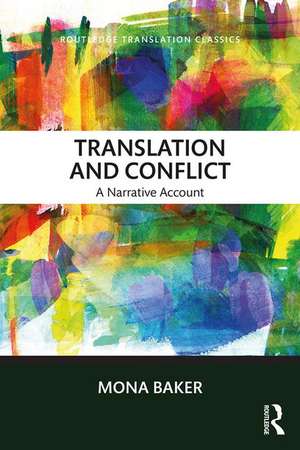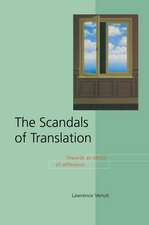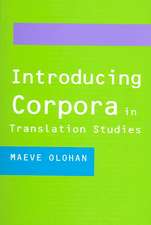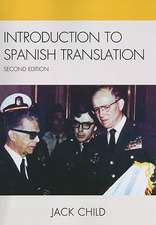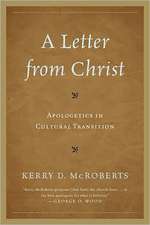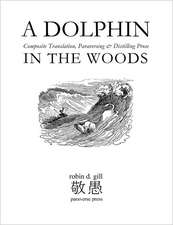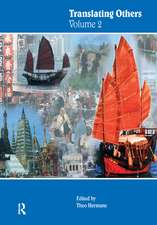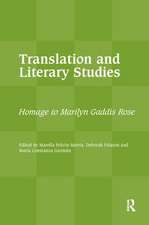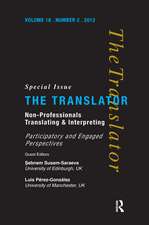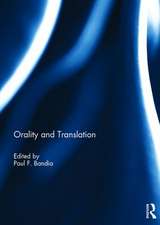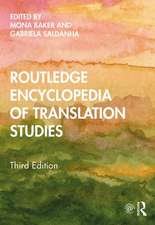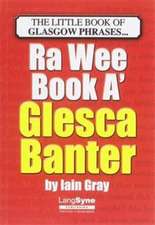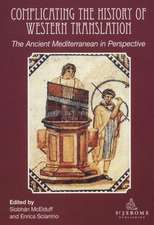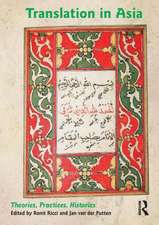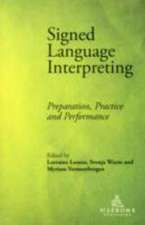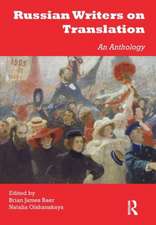Translation and Conflict: A narrative account: Routledge Translation Classics
Autor Mona Bakeren Limba Engleză Paperback – 17 oct 2018
| Toate formatele și edițiile | Preț | Express |
|---|---|---|
| Paperback (2) | 294.97 lei 3-5 săpt. | +17.63 lei 4-10 zile |
| Taylor & Francis – 17 oct 2018 | 294.97 lei 3-5 săpt. | +17.63 lei 4-10 zile |
| Taylor & Francis – 12 apr 2006 | 347.98 lei 6-8 săpt. | |
| Hardback (2) | 895.08 lei 6-8 săpt. | |
| Taylor & Francis – 18 apr 2006 | 895.08 lei 6-8 săpt. | |
| Taylor & Francis – 17 oct 2018 | 1000.27 lei 6-8 săpt. |
Preț: 294.97 lei
Nou
Puncte Express: 442
Preț estimativ în valută:
56.45€ • 58.72$ • 46.60£
56.45€ • 58.72$ • 46.60£
Carte disponibilă
Livrare economică 25 martie-08 aprilie
Livrare express 08-14 martie pentru 27.62 lei
Preluare comenzi: 021 569.72.76
Specificații
ISBN-13: 9781138600447
ISBN-10: 113860044X
Pagini: 226
Ilustrații: 1 Line drawings, black and white; 14 Halftones, black and white; 1 Illustrations, black and white
Dimensiuni: 156 x 234 x 15 mm
Greutate: 0.32 kg
Ediția:Nouă
Editura: Taylor & Francis
Colecția Routledge
Seria Routledge Translation Classics
Locul publicării:Oxford, United Kingdom
ISBN-10: 113860044X
Pagini: 226
Ilustrații: 1 Line drawings, black and white; 14 Halftones, black and white; 1 Illustrations, black and white
Dimensiuni: 156 x 234 x 15 mm
Greutate: 0.32 kg
Ediția:Nouă
Editura: Taylor & Francis
Colecția Routledge
Seria Routledge Translation Classics
Locul publicării:Oxford, United Kingdom
Cuprins
Contents
List of Figures
Acknowledgements
Introduction to the Classic Edition
7.2 Coherence (probability)
7.3 Fidelity
7.4 Assessing narratives: applying the model
7.5 Concluding remarks
Glossary
Notes
Bibliography
Index
List of Figures
Acknowledgements
Introduction to the Classic Edition
- Introduction
- Translation, power, conflict
- Why narrative?
- Overview of Chapters
- Introducing narrative theory
2.1 The status and effects of narrativity
2.2 Defining narrative
2.3 The political import of narratives - A typology of narrative
3.1 Ontological narratives
3.2 Public narratives
3.3 Conceptual (disciplinary) narratives
3.4 Meta- (master) narratives - Understanding how narratives work: features of narrativity I
4.1 Temporality (Bruner’s narrative diachronicity)
4.2 Relationality (Hermeneutic composability)
4.3 Causal emplotment
4.4 Selective appropriation - Understanding how narratives work: features of narrativity II
5.1 Particularity
5.2 Genericness
5.3 Normativeness/canonicity and breach
5.4 Narrative accrual - Framing narratives in translation
6.1 Framing, frame ambiguity and frame space
6.2 Temporal and spatial framing
6.3 Selective appropriation of textual material
6.4 Framing by labelling
6.5 Repositioning of participants - Assessing narratives: the narrative paradigm
7.2 Coherence (probability)
7.3 Fidelity
7.4 Assessing narratives: applying the model
7.5 Concluding remarks
Glossary
Notes
Bibliography
Index
Notă biografică
Mona Baker is Professor Emerita of Translation Studies at the University of Manchester, UK, and Director of the Shanghai Jiao Tong Baker Centre for Translation and Intercultural Studies, China (www.jiaotongbakercentre.org). She is Founding Vice President of the International Association of Translation and Intercultural Studies (IATIS, 2004–2015) and author/editor of several leading titles in translation studies, including In Other Words (Routledge 3e 2018) and co-editor of The Routledge Encyclopedia of Translation Studies (Routledge, 2e, 2008)
Descriere
Translation and Conflict was the first book to demonstrate that translators and interpreters participate in circulating as well as resisting the narratives that create the intellectual and moral environment for violent conflict and social tensions. With a new preface by Sue-Ann Harding, Translation and Conflict is more than ever the essential text for any student or researcher interested in the study of translation and social movements.
Recenzii
'The compelling arguments, the topicality of the many examples and their wide range of reference, the clarity of the writing, and the finely poised balance between the author’s scholarly rigour and her lucid awareness of indeterminacy and ideology make this a particularly exciting and challenging piece of scholarship.' - Dirk Delabastita, University of Namur, Belgium
'Scientific and critical, never gratuitously polemic, ... This groundbreaking volume rigorously examines the relation between translation, power and conflict. In this courageous volume, Mona Baker shows the importance in today’s global world of translation and interpreting for life over the planet, and succeeds in calling our attention to the responsibilities that the translator and interpreter must never evade.' – Susan Petrilli, University of Bari, Italy
'A compelling account and an intellectually honest enquiry into the issues involved in handling competing narratives, of vital interest not only to translators and translation theorists but also to users of translation products.' – Ian Mason, Heriot Watt University, UK
'Translation and Conflict undoubtedly constitutes a turning point in Translation Studies.' - África Vidal Claramnote, University of Salamanca, Spain
'Perceptive, provocative and always engaging, …. a timely investigation into a hidden realm of translation practice where the stakes – human, political and international – are growing ever higher.' - David Johnston, Queen’s University Belfast, UK
'Conclusively, this interdisciplinary publication complete with a practical and clearly-written glossary is perfectly illustrated by lively, interesting and telling contemporary examples throughout, which not only help the reader understand the main points put into practice but, at the same time, serve as a many-faceted backdrop to the soulful conflicts and instances of political aggression currently interweaving the texture of our global planet.' - Károli Gáspár University of Hungarian Reformed Church
'Translation and Conflict is a remarkable work that puts forward a very careful and critical analysis of the subtle shifts that take place in various personal and shared narratives in the process of translation.' - Scott S. Elliott, The Bible Translator
'... a serious, precise work offering sharp and new perspectives on the present day world economic, social, political and military reality in which the role played by translators and interpreters in the shaping of the world shall be considered and recorded.' - Babel
'...an outstanding book... its subject matter and approach give it an appeal that goes far beyond the concerns of translation studies... the book acheives the very rare feat of being eloquent and accessible to the non-specialist reader, and at the same time, rigorous and nuanced in its arguement... Translation and Conflict is an interesting, incisive, timely and very readable analysis of an important subject which deserves a wide audience.' - Richard Jackson, Aberystwyth University
'… a compelling account and an intellectually honest enquiry into the issues involved in handling competing narratives, of vital interest not only to translators and translation theorists but also to users of translation products.' - Ian Mason, Heriot Watt University, UK
'Translation and Conflict undoubtedly constitutes a turning point in Translation Studies.' - África Vidal Claramnote, University of Salamanca, Spain
'Perceptive, provocative and always engaging, …. a timely investigation into a hidden realm of translation practice where the stakes – human, political and international – are growing ever higher.' - David Johnston, Queen’s University Belfast, UK
'Conclusively, this interdisciplinary publication complete with a practical and clearly-written glossary is perfectly illustrated by lively, interesting and telling contemporary examples throughout, which not only help the reader understand the main points put into practice but, at the same time, serve as a many-faceted backdrop to the soulful conflicts and instances of political aggression currently interweaving the texture of our global planet.' - Károli Gáspár University of Hungarian Reformed Church
'Scientific and critical, never gratuitously polemic, ... This groundbreaking volume rigorously examines the relation between translation, power and conflict. In this courageous volume, Mona Baker shows the importance in today’s global world of translation and interpreting for life over the planet, and succeeds in calling our attention to the responsibilities that the translator and interpreter must never evade.' – Susan Petrilli, University of Bari, Italy
'A compelling account and an intellectually honest enquiry into the issues involved in handling competing narratives, of vital interest not only to translators and translation theorists but also to users of translation products.' – Ian Mason, Heriot Watt University, UK
'Translation and Conflict undoubtedly constitutes a turning point in Translation Studies.' - África Vidal Claramnote, University of Salamanca, Spain
'Perceptive, provocative and always engaging, …. a timely investigation into a hidden realm of translation practice where the stakes – human, political and international – are growing ever higher.' - David Johnston, Queen’s University Belfast, UK
'Conclusively, this interdisciplinary publication complete with a practical and clearly-written glossary is perfectly illustrated by lively, interesting and telling contemporary examples throughout, which not only help the reader understand the main points put into practice but, at the same time, serve as a many-faceted backdrop to the soulful conflicts and instances of political aggression currently interweaving the texture of our global planet.' - Károli Gáspár University of Hungarian Reformed Church
'Translation and Conflict is a remarkable work that puts forward a very careful and critical analysis of the subtle shifts that take place in various personal and shared narratives in the process of translation.' - Scott S. Elliott, The Bible Translator
'... a serious, precise work offering sharp and new perspectives on the present day world economic, social, political and military reality in which the role played by translators and interpreters in the shaping of the world shall be considered and recorded.' - Babel
'...an outstanding book... its subject matter and approach give it an appeal that goes far beyond the concerns of translation studies... the book acheives the very rare feat of being eloquent and accessible to the non-specialist reader, and at the same time, rigorous and nuanced in its arguement... Translation and Conflict is an interesting, incisive, timely and very readable analysis of an important subject which deserves a wide audience.' - Richard Jackson, Aberystwyth University
'… a compelling account and an intellectually honest enquiry into the issues involved in handling competing narratives, of vital interest not only to translators and translation theorists but also to users of translation products.' - Ian Mason, Heriot Watt University, UK
'Translation and Conflict undoubtedly constitutes a turning point in Translation Studies.' - África Vidal Claramnote, University of Salamanca, Spain
'Perceptive, provocative and always engaging, …. a timely investigation into a hidden realm of translation practice where the stakes – human, political and international – are growing ever higher.' - David Johnston, Queen’s University Belfast, UK
'Conclusively, this interdisciplinary publication complete with a practical and clearly-written glossary is perfectly illustrated by lively, interesting and telling contemporary examples throughout, which not only help the reader understand the main points put into practice but, at the same time, serve as a many-faceted backdrop to the soulful conflicts and instances of political aggression currently interweaving the texture of our global planet.' - Károli Gáspár University of Hungarian Reformed Church
